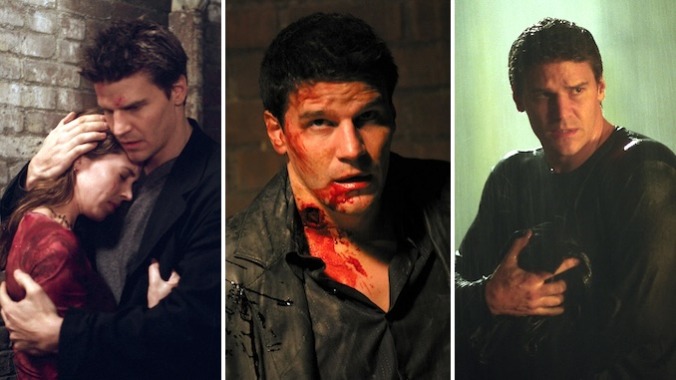
Editor’s Note: This weekend marks the 20th anniversary of “Not Fade Away,” the final episode of Angel, so to celebrate, we’re looking back on the finale itself and highlighting our favorite episodes. For more Buffy and Angel, check out our previous coverage on the cult series.

Spinoff shows can be a tough nut to crack. You have to firmly plant the show as its own entity, while not losing the magic of what came before. Angel walked that fine line for five wonderful seasons of television, bringing a darker tone than we had previously seen on Buffy the Vampire Slayer, without losing the charm that made its predecessor such a joy.
While the show certainly had some duds, there are plenty of episodes that match the very best of Buffy, and really helped Angel stand on its own two feet, side by side with its parent series. Starting off as a much more grounded show, bringing a play on the classical noir genre of Los Angeles detective shows, Angel broadened its horizons in later seasons, tackling more and more grand, supernatural ideas.
The finest episodes of the series tackled everything from the bonds of family to surrealist romance, right down to the nature of human sin. They make you laugh, and at times, they make you cry—like the best TV episodes do.
Below, we’ve rounded up the very best episodes of Angel for you to enjoy, featuring everyone’s favorite brooding vampire… And we promise, “The Shroud of Rahmon” isn’t on the list.

15. “Lineage,” Season 5, Episode 7
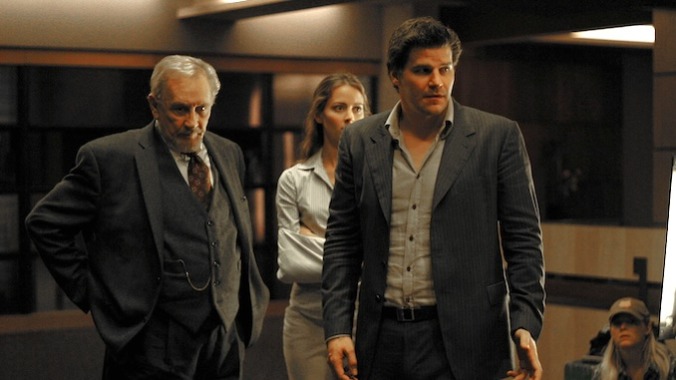
One of the few Wesley Wyndam-Pryce (Alexis Denisof) showcase episodes, and a great reminder of why we should have had so many, many more. Denisof was in complete command of the character from the moment we met him in the Sunnydale High library, right up until his final scene in “Not Fade Away.” “Lineage” is a perfect episode to show how far Wesley had come to that point, for better or worse.
It taps into the fraught emotions of fractured father/son relationships, with Wesley’s “Father” appearing, intent on reforming the Watcher’s Council. What follows is a pretty wild episode involving cyborg samurais that somehow is far better than your imagination is telling you as you read this—but at its heart, “Lineage” is about stepping out of a parent’s shadow.
It’s a great encapsulation of Wesley’s overall arc, reminding us of what he once was as a bumbling intellectual, and what he has now become: a man standing on his own two feet who will go to almost any length, no matter how violent, to protect his friends.
14. “Origin,” Season 5, Episode 18
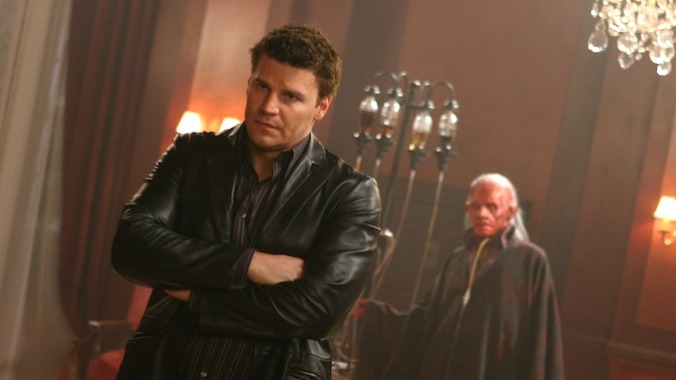
There’s a lot of pathos within Angel (David Boreanaz) and Connor’s (Vincent Kartheiser) story throughout Seasons 3 and 4, ending with Angel’s gut-wrenching deal to give his son a “normal” life. Naturally, this being Angel, it wasn’t always going to end on that neat little note, so when Connor re-enters the story in Season 5’s “Origin,” it’s a welcome return.
Unaware of his true parentage but hunted by demonic forces, Connor and his new family go to Wolfram & Hart for protection and guidance, with everyone but Angel seeing it as an ordinary case (by their standards). It all unravels wonderfully, with Wesley learning Connor’s true origins and the deal Angel made, before the Connor of old comes to the fore with all of his simmering rage.
Season 5 did a great job of building towards the endgame, and Connor’s reintroduction is a huge part of it. It’s an excellent episode that sets up Angel and Connor’s final reunion, while also tying up loose ends from the past.
13. “Lullaby,” Season 3, Episode 9
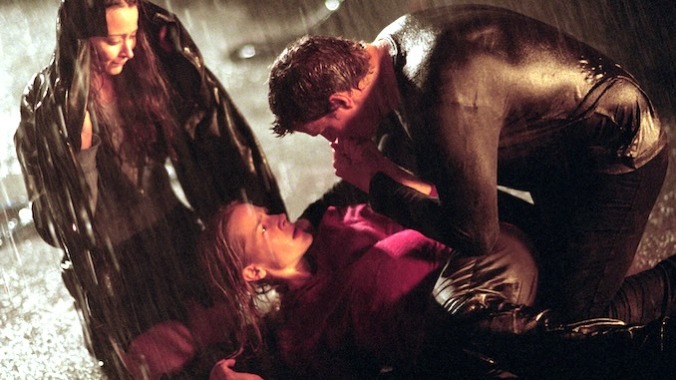
One of the most emotionally raw episodes of Angel, with Darla’s (Julie Benz) death and the birth of Connor. There’s a lot of stuff happening around that moment in the alley, with Holtz’s (Keith Szarabajka) chase, Sahjhan being a dick, the destruction (again) of Caritas… but “Lullaby” succeeds thanks to Benz, Boreanaz, and the devastating dialogue between them before she dies.
Redemption is the constant theme throughout Angel, and while that primarily concerns the titular character, it isn’t an exclusive character development. Darla’s redemption is just as worthy, and her sacrifice is one of the highlights across both Angel and Buffy—it holds that much weight. Seeing Angel cradle his child before Holtz allows him to leave is one of those images in the show that sticks with you for a long time.
12. “Apocalypse, Nowish,” Season 4, Episode 7
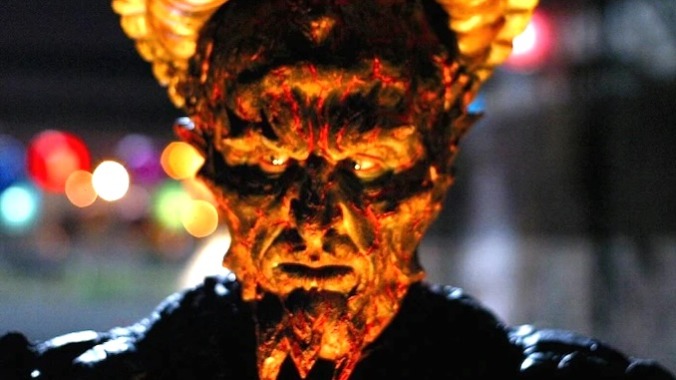
Let’s get the elephant in the room out of the way. The closing moments of Cordelia (Charisma Carpenter) and Connor sleeping together are as icky as you’ll see on television and were part of a wider character assassination that just sucked. Charisma Carpenter deserved better.
The rest of this episode though, oh boy, is it a doozy. There’s a crackling tension as the apocalypse really does seem to be happening, with a Satan-looking demon breaking through the ground and raining down fire on Los Angeles. It all culminates with Angel, Wesley, Gunn (J. August Richards), and Lorne (Andy Hallett) taking on the Beast up on a rooftop of a LA sky-bar, in a sequence full of homages to classic action movies of the past.
If you remove the final minute, “Apocalypse, Nowish” is just a blast of an episode.
11. “Five by Five” and “Sanctuary,” Season 1, Episodes 18 and 19
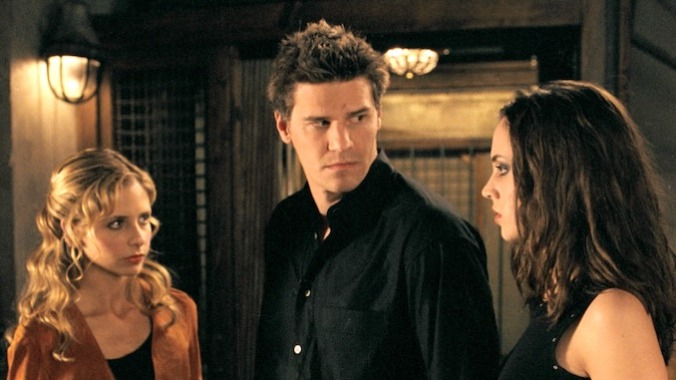
This two-parter in the back half of Season 1 is an excellent reminder that within the Whedonverse, Eliza Dushku’s Faith is one of the most complex and nuanced characters. Her introductory arc in Season 3 of Buffy is outstanding, as is her mini-arc in the middle of Season 4. It’s no different when she jumps over to Los Angeles.
At the start of “Five by Five,” Faith is as we know her best. She’s dangerous and cruel, intent on inflicting pain on those in her way. She straight-up tortures Wesley, to give just one example. But it’s all just empty, a way to force someone else to end her misery and kill her, as she begs Angel to do at the close of the episode. By “Sanctuary,” Faith is trying to find her own absolution, tortured by her own past deeds. Then Buffy (Sarah Michelle Gellar) arrives, they all team up to fight off the Watcher’s Council’s Special Operations team before Faith turns herself in to face up to the consequences of her actions.
It’s a powerful depiction of trauma and personal growth for one of the series’ most troubled souls.
10. “Orpheus,” Season 4, Episode 15
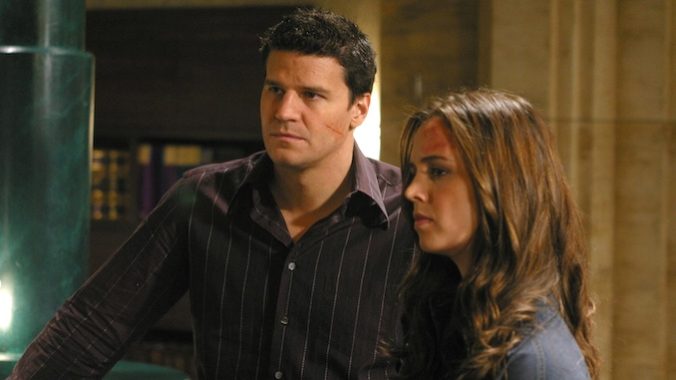
This episode is Faith’s final act on Angel before heading over to Buffy and helping save the world once more. There’s a tremendous chemistry between Faith and Angel whenever they share the screen, and never more so than in “Orpheus,” where Faith has drugged her blood, and in doing so, drugged Angelus—leading to a shared comatose experience through Angel/Angelus’ life.
The conclusion is a fight between the evil Angelus and his benevolent alter-ego for control, all the while a guest-starring Willow (Alyson Hannigan) works on a spell to re-ensoul Angel in the Hyperion Hotel. It’s an excellent way to wrap up both Faith’s overall arc in Angel, as well as the Angelus arc of Season 4.
9. “Over the Rainbow,” “Through the Looking Glass,” and “There’s No Place Like Plrtz Glrb,” Season 2, Episodes 20, 21, and 22
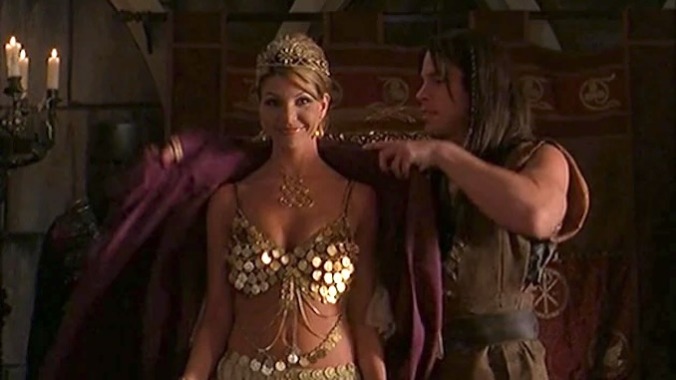
The closing arc of Season 2, or the “Pylea Arc” if you’re so inclined, is a triumph from start to finish. The gang’s back together now that Angel has dealt with his existential misery, Lorne is more-or-less part of the team, and they’re about to accept Fred (Amy Acker) into their ranks. Wonderful.
Pair that with the setting of Pylea—Lorne’s home dimension, to which Cordelia has been accidentally sucked into and needs rescuing—and it’s excellent television. The setting gives the show a chance to flex some muscles with more expansive action set-pieces, as well as some intriguing world-building, like Angel’s vampire form being a far more primal, feral being in this hellscape than the bumpy-faced bloodsucker we’re used to on Earth.
All in all, it’s a smart way to close Season 2, which, while great, did get bogged down for a stretch by being a bit too bleak. The Pylea Arc was a great palate cleanser for that, offering up a three-part pulpy adventure to sink your teeth into.
8. “Waiting in the Wings,” Season 3, Episode 13
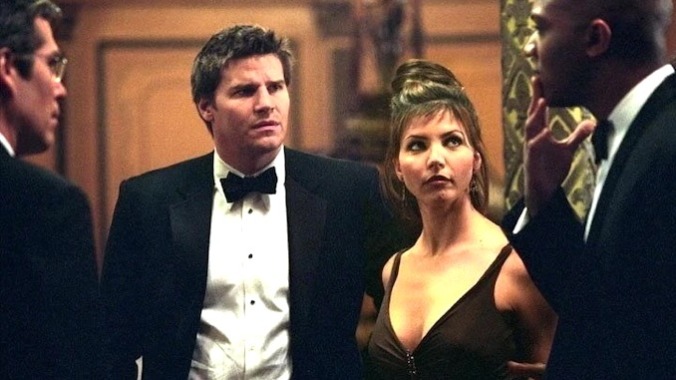
One of the more surreal episodes in the Whedonverse, written and directed by the man himself, “Waiting in the Wings” sees Angel take everyone out to the ballet, only to realize that the prima ballerina is the same from 100 years past. There’s a mystery to solve, sure, but the episode focuses on grander themes than that.
It’s about passion and unrequited love, and the lengths people go to fulfill it. Angel and Cordelia are possessed by spirits that force them to gain a level of intimacy the show had so far steered clear of, while the Wesley/Gunn/Fred love triangle progresses, shifting the relationships between the trio. A great episode all around, but one led incredibly by the bubbling romance within the core cast.
7. “Hero,” Season 1, Episode 9
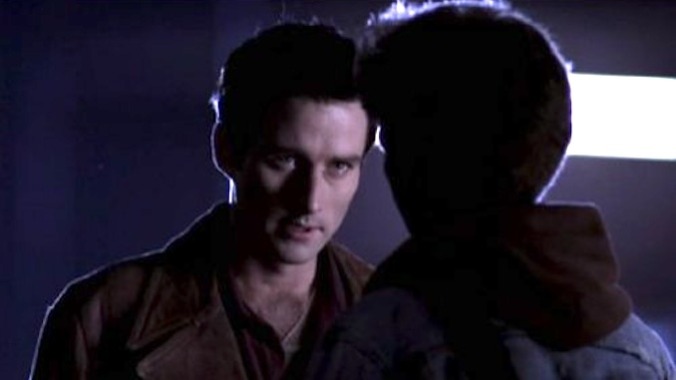
There was so much to love about Glenn Quinn’s Doyle, a half-human/half-demon who assists Angel with visions from the Powers That Be. He brought an everyman charm to a show centered around a vampire with a soul, much in the same way Xander Harris (Nicholas Brendon) brought that quality to Buffy the Vampire Slayer.
His death was always planned for early in the show’s run, however, with Joss Whedon feeling like Quinn brought too much intensity to the role, something the show had ample amounts of from its lead in Boreanaz. The caveat was that Doyle got a fitting send-off in the Season 1 episode “Hero.” Exploring his demon heritage, the show introduces us to The Scourge, one of the more unpleasant Monster-of-the-Week villains—a Nazi-coded army of demon supremacists, hellbent on wiping out all demons not of “pure” blood.
So much of Angel hinges on the titular character’s role as a champion of humanity, but it’s a neat twist early in the show to remind the audience that anyone can be a hero if they just stand up and fight evil. Angel is a blend of a lot of genres, but that theme is a fantasy staple, and it works so well in this fond farewell to a pillar of the early season.
6. “Reprise,” Season 2, Episode 15
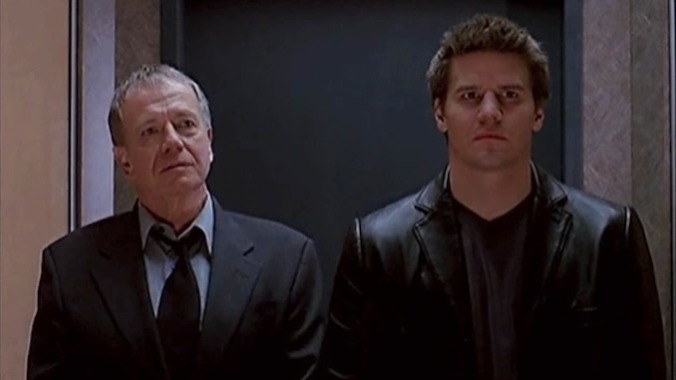
There’s a lot of episodes in Season 2 that standout within Angel’s existential misery phase over Darla. “Reunion” is great, “Redefinition” has some good moments, but ultimately, “Reprise” is just a fascinating episode. There’s a lot going on, from Angel’s desperation to eliminate Wolfram & Hart, Darla’s desperation to eliminate Angel, Wesley, Cordelia and Gunn’s dire need of work—it’s all quite bleak.
The main thrust of that despair is saved for the end though, with Angel defeating the bad guy (sort of) and being offered a chance to go to the “Home Office,” Wolfram & Hart’s center of evil. A long elevator ride leaves you waiting for Angel to emerge in some horrific hell dimension, only to come out right where he started. Wolfram & Hart thrives because of the inherent cruelty of humanity, and it’s a sobering message for any show to tackle. Sam Anderson’s Holland Manners does an excellent job, chewing every inch of scenery in his long speech, giving it the gravitas it needed to stand out like this.
5. “Sleep Tight” and “Forgiving,” Season 3, Episodes 16 and 17 Season Three
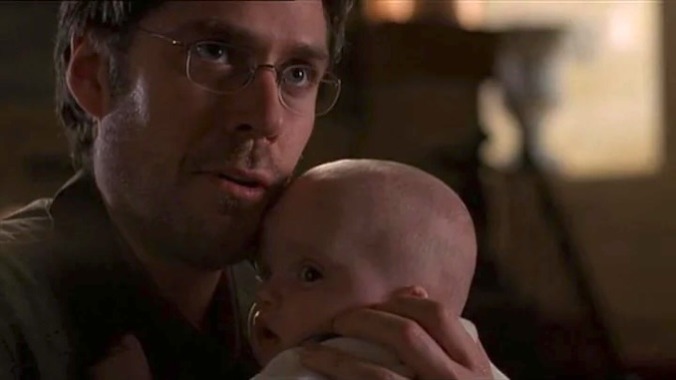
“Sleep Tight” and “Forgiving,” better known as the Connor abduction arc, are the culmination of a lot of disparate plot threads coming to head and hitting a devastating conclusion. Every now and then, Angel would deliver a gut-punch in the most shocking of ways, but nothing like Connor being abducted into a hell dimension is about as bad as it gets.
That wasn’t enough for this unofficial two-parter though, as the next episode closes with Angel (importantly, not Angelus) attempting to murder Wesley for his role in Connor’s abduction. It’s staggeringly visceral, and the closing lines of Angel screaming “You’re a dead man, Pryce” linger long after the credits roll.
4. “Tomorrow,” Season 3, Episode 22
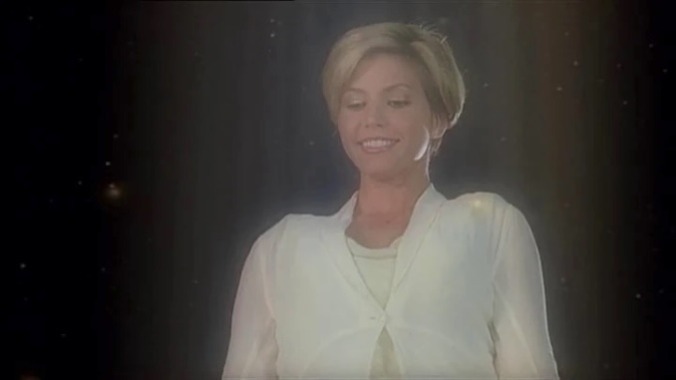
Angel season finales, much like Buffy’s, were always great. “Tomorrow” is no exception, packed with moments from start to finish. Cordelia’s ascension to a higher plane of existence… sort of; Lilah’s seduction of Wesley and the start of that relationship; the payoff for Holtz’s manipulation of Connor—it all ties together seamlessly.
The final image of Angel sinking to the depths of the ocean in a sealed coffin is one of Angel’s most lasting. Connor’s relationship with his father is an emotional rollercoaster from start to finish, but this is such a bleak turn in that journey, and it’s great the show was brave enough to end a season on it.
3. “Not Fade Away,” Season 5, Episode 22
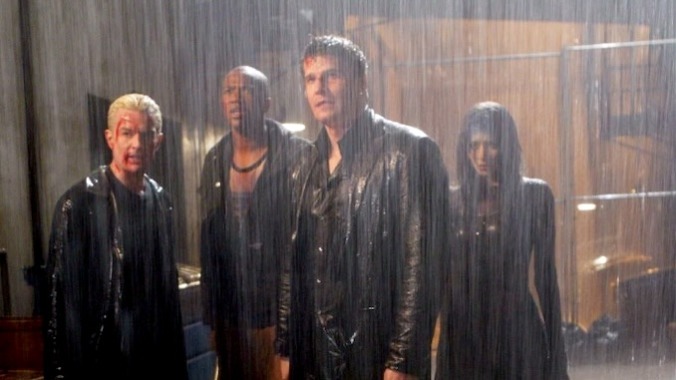
Ignoring the absurdity of Angel’s early cancellation, the series finale is nothing short of exceptional television. Every single character gets multiple moments to round out their respective arcs beautifully, from Wesley and Illyria/Fred’s final moments together, to Angel and Connor’s goodbye.
It all felt in keeping with the wider themes of the show: the search for redemption and fighting the good fight against evil. It’s Angel’s continued fight though that really elevates the episode, having signed away his destiny of becoming human in the prior episode. There’s no longer any grand reward for our hero, other than his own personal redemption, and it’s really quite beautiful.
The Shanshu Prophecy plays a pivotal role throughout the entirety of the show’s run, so to see it fundamentally not matter by the end, and for that decision to actually be beneficial to the overall narrative is bold storytelling worthy of a series finale.
2. “Are You Now or Have You Ever Been?” Season 2, Episode 2
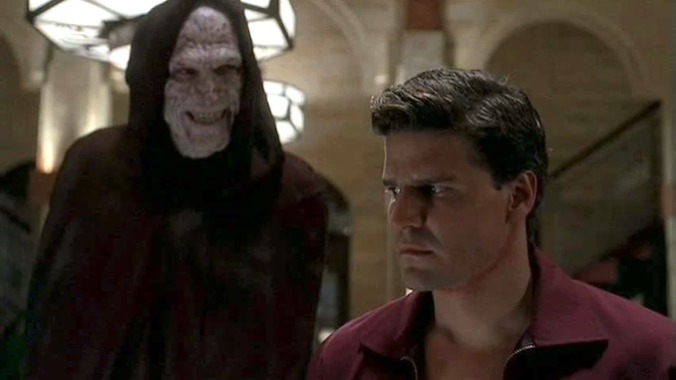
Widely considered the show’s best standalone episode, “Are You Now or Have You Ever Been?” is a paranoid thriller centered around Angel in Los Angeles during the height of McCarthyism. It’s a thoughtful, compelling insight into Angel’s past in a way neither this show, nor Buffy, had explored to this point.
The champion of humanity, fighting evil and doing so with all the brooding and stoicism we grew to love with Angel is replaced by a cynical, beaten-down figure who wants nothing more than to be left alone. But it also taps into the social consciousness of the time, and the paranoia and prejudices that existed in 1950s America. It works as its own miniature redemption arc for Angel, within the wider one the series is telling, as his history with the Hyperion Hotel, his willingness to leave them to their fate, and his desire to rectify the wrong is all explored. It’s a thematically resonant story within the broader arc of Angel, told in a new and intriguing way. It’s hard not to admire what the show accomplished here.
1. “A Hole in the World,” Season 5, Episode 15
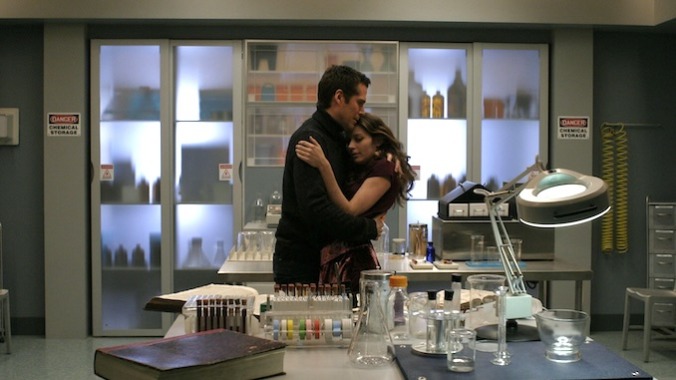
It can’t really be overstated how important Winifred “Fred” Burkle was for Angel to evolve as a show. She enters in the three-part Season 2 finale, and immediately establishes herself as a character to root for as a core cast member, oftentimes acting as a moral guide for the Angel Investigations (and later, Wolfram & Hart) team.
All of that makes her death in Season 5’s devastating “A Hole in the World” so shocking, maybe the most shocking moment in the series overall. An innocuous puff of dust at the start of the episode is the vehicle for Fred’s body to be hollowed out so an ancient demon named Illyria can take hold, and the episode goes to great lengths to demonstrate the inevitability of her impending death.
It works on so many levels, from the emotion of the story, the tension between Gunn and Knox (Jonathan M. Woodward), the fight shown by Angel and Spike (James Marsters) to save her, and so on—but the episode soars thanks to Amy Acker and Alexis Denisof. The chemistry between the pair has been both a delight and a tragedy for their time together on Angel, and just when it seems like Fred and Wesley will get their happily-ever-after romance, it’s dashed away in the cruelest way possible. Perfect television.
Jack Francis is a freelance TV, film and culture writer based in Nottingham. For more of his thoughts on TV and film, or his obsession with Star Wars, you can follow him @jackfrancis94
For all the latest TV news, reviews, lists and features, follow @Paste_TV.